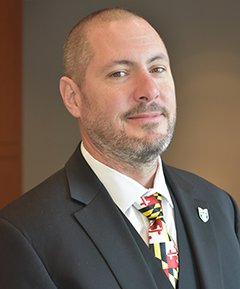
Region VI Vice President
Maryland
(410) 751-3630
Email
Mr. Aaron Geiman, from Maryland, earned his Bachelor of Science Degree from Oklahoma State University in 1997, double-majoring in Animal Science and Agricultural Education. In 2009, he earned a M.Ed. in Career and Technical Education from University of Maryland Eastern Shore. He was elected as the Region VI Vice President at the 2022 NAAE Convention.
Mr. Geiman has taught agricultural education since January 1998, first at his alma mater, North Carroll High, then, after school consolidation in 2016, at Westminster High, in the same district. He has served as FFA Advisor at both schools, taking numerous individuals and teams to state, regional, and national competitions for Career Development Events and Leadership Development Events. Additionally, in the past three years, three Westminster High FFA Members have been named FFA State Stars, one earning gold status in the National FFA Proficiency Awards Program.
As an agricultural education leader, Mr. Geiman has attended numerous ACTE/NAAE national conventions, as an executive board member/officer for the Maryland Agriculture Teachers’ Association, as a committee member and chairperson for NAAE Public Policy and Marketing committees, and as a regional award winner for NAAE awards.
Mr. Geiman also serves as a Master Teacher for the Curriculum for Agricultural Science Education (CASE), a project of the National Council for Agricultural Education, managed by NAAE. With CASE, he has assisted with curriculum development and revision, teacher training at institutes, and promotion of CASE at local, state, and national events.
In 2011, Mr. Geiman was named the Carroll County Teacher of the Year, and a finalist for Maryland Teacher of the Year. In 2015, Mr. Geiman was named NAAE Region VI Outstanding Agricultural Educator. In 2019, Mr. Geiman was named ACTE Region 1 CTE Teacher of the Year and National Finalist.
Mr. Geiman’s educational philosophy, which seems well demonstrated through his students’ actions and his own, is fully rooted in experiential learning. Students learn by engaging in actions that construct meaning. Place them in a well-designed experience, and learning will inevitably occur.